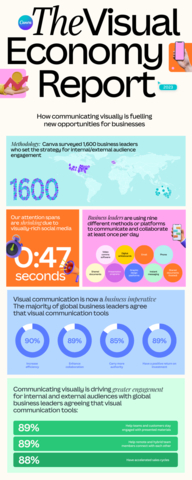SYDNEY & SAN FRANCISCO--(BUSINESS WIRE)--Canva, the world’s only all-in-one visual communication platform, today released The Visual Economy Report featuring actionable data from 1,600 global business leaders. It provides the most comprehensive view into how global business leaders are approaching visual communication principles internally and externally to run more efficient teams, build stronger audience engagement, and fuel greater economic returns on their business.
Among the top findings of The Visual Economy Report:
-
Visual communication enhances workplace efficiency and collaboration. Nearly all business leaders agree that visual communication methods increase efficiency (90%), enhance collaboration (89%) and carry more authority (85%) than other methods of communication. The majority (89%) also agree visual communication tools result in stronger business returns.
-
Visual communication accelerates sales cycles. With teams more global than ever, visual communication is making it possible for them to be more collaborative; therefore, more productive in a world that’s now digital-first.
In fact, the majority of global business leaders (89%) believe visual communication has had a positive impact on remote and hybrid team members connecting with each other. Eighty-eight percent also say visual communication tools have accelerated their sales cycles. That’s because most business leaders (85%) agree that visual content is generally more digestible, leading to more responsive prospects that stay engaged throughout the sales process.
-
Design literacy is now table stakes for most jobs. Design literacy has become critical for most professionals beyond trained designers. For this reason, more than half of business leaders (61%) say that employees in non-design roles are expected to have extensive design knowledge, such as the ability to create persuasive visual assets and engaging presentations, as well as being able to edit others’ designs with ease. As a result, nearly two-thirds (63%) provide training to those not in graphic-design roles.
-
Businesses need better visual content. Businesses are plagued by consistency, workflow, and quality issues with their design platforms. Nearly two-thirds of business leaders (64%) say that their company lacks a streamlined visual design software platform, and more than half agree their content is neither aesthetically pleasing (53%) nor consistent (56%).
- Gen Z is driving design in the workplace. Gen Z is more agile and creative and is embracing visual communication tools more frequently in the workplace. More than other generations, Gen Z (93%) feel visual communication helps them articulate ideas better.
Today’s businesses are operating in a newfound visual economy, where shrinking attention spans and an explosion of digital content have led to a demand for compelling, shareable visuals. Employees and customers now expect a brand's content to be as visual and digestible as what they see across social media platforms. As a result, there are significant business opportunities for those that embrace a design-first approach by empowering everyone in their organization to design, leading to the ability to produce tremendous levels of quality content at scale.
“As business leaders navigate a changing economic environment, visual communication can help brands get ahead. From helping win new customers, to attracting and retaining talent, to marketing in a way that breaks through, visual communication has never been more critical to unlocking better communication, collaboration and creativity,” said Zach Kitschke, CMO of Canva. “Today, capturing anyone’s attention can be fleeting so great design can be make or break for organizations who strive to stand out in this new visual era.”
Canva’s “The Visual Economy Report 2023,” can be found in full here.
Methodology
Canva commissioned Morning Consult to survey 1,600 business leaders in marketing, sales, HR, and commerce who have knowledge of company revenue goals. This group also influences their organizations’ audience engagement strategy, as well as how internal teams communicate with each other, other teams, and the company at large. Specifically, Canva surveyed 850 business leaders in the U.S., 375 in Australia, and 375 in the UK.
About Canva
Launched in 2013, Canva is a free online visual communications and collaboration platform with a mission to empower everyone in the world to design. Featuring a simple drag-and-drop user interface and a vast range of templates ranging from presentations, documents, websites, social media graphics, posters, apparel to videos, plus a huge library of fonts, stock photography, illustrations, video footage, and audio clips, anyone can take an idea and create something beautiful.
Downloadable Assets
Click here.








